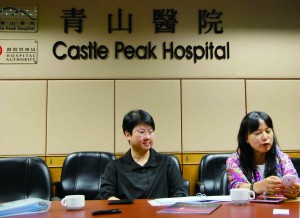Shortage of mental health care resources impacts quality of care received by patients
By Tracy Chan and Cindy Ng
She always felt there were people stalking her and plotting to harm her. She could hear a man’s voice persuading her to kill herself. She constantly talked to herself out loud. Her mother took her to a hospital and she was diagnosed with schizophrenia.
That was more than 30 years ago and now Florence, who does not want to disclose her full name, has regular follow-up consultations in public hospitals and takes antipsychotics to control her schizophrenia symptoms. Although the prescribed drugs have significantly relieved her symptoms, she suffers from some side effects, such as slightly trembling fingers and occasional eye-rolling.
Florence, who is in her mid-50s, is one of the 44,850 diagnosed schizophrenic patients in Hong Kong who are in contact with public hospitals’ psychiatric services. According to the Hospital Authority, there are 195,000 people in Hong Kong who have been diagnosed with mental illnesses and have used the authority’s psychiatric services.
Mental illness includes a wide range of conditions that diminish one’s ability to cope with the ordinary demands of life – disrupted thinking, feelings, moods, relationships and daily functioning. In Hong Kong, common mental disorders are affective disorders like anxiety and depression and severe mental illness such as schizophrenia.
Seeing the prevalence of mental illness in Hong Kong, the Hospital Authority has increased mental health expenditure from 8.2 per cent of total health expenditure in 2007 to 8.7 per cent in 2012. But the ratio of mental health professionals to mental health patients remains low, far behind that found in other developed economies.
The shortage of personnel has a knock-on effect on the time allocated to each patient. Dr Arthur Mak Dun-ping, associate professor in the Department of Psychiatry at the Chinese University of Hong Kong, says doctors have to meet nearly 30 patients in an afternoon on a daily basis.
Mak says that when he describes this situation in meetings with psychiatrists from other countries, no one believes him. “They think this is India. It is only acceptable to have 30 cases if this happens in a third world country,” Mak says. He says doctors in the United Kingdom only deal with five cases in one afternoon.
Conditions are no better when it comes to psychiatric rehabilitation services. Peter Hui Wai-chun, a registered social worker who has worked for the Concord Mutual-Aid Club Alliance, a patients’ group for seven years, says: “A social worker has to handle 70 to 80 cases. On average, they see a patient once every one to two months, most of them just contact patients via phone calls.”

Hui says the lack of manpower creates high pressure and stress for social workers. Many of his peers and colleagues in psychiatric social work and community mental health services leave the field or transfer to other social work sectors.
The shortage of frontline mental health professionals also affects the quality of care received by each patient. 55-year-old Ching, who does not wish to disclose her full name, suffers from depression. In her experience, public hospital doctors have no time to explain the side effects of psychiatric drugs and conduct non-drug counselling.
“The time given is not enough, but I know they [doctors] have to handle a lot of cases. I feel I should not take up so much time, so, I will automatically not to talk too much with them,” she says.
Michael Mak Kwok-fung, president of Hong Kong College of Mental Health Nursing, thinks the poor human resources planning and management in this area shows the government has adopted a piecemeal and reactive approach to handling mental health care. Mak says the administration only allocates resources to a certain area when there is a problem, such as when there is an incidence of violence committed in the community.
Mak thinks the government pays little attention to mental healthcare planning because people with mental illness and mental health problems do not have much of a voice in society. They are afraid to speak out because of social stigma. “Stakeholders are being discriminated against; whoever helps to voice their opinions faces discrimination too. For many years, we have cast these people into a corner, so no one knows about the problem,” says Mak.
As long as the faces of those with mental health issues are hidden, they have little bargaining power when fighting for greater allocation of resources. Mak says that only those with strong public voices will be given more resources.
The lack of mental healthcare resources in general has also exacerbated a persistent perception that public hospitals in Hong Kong only prescribe older psychiatric drugs because they are cheaper.
Although it may have been the case that Hong Kong was slower to offer newer anti-psychotic medications than countries in the west, those drugs are now widely available in the public system.
Dr Arthur Mak Dun-ping, associate professor in the Department of Psychiatry at the Chinese University of Hong Kong, says financial constraints are no longer a major consideration. “The patent of new drugs [second-generation antipsychotics] has expired and we can use a fair price to buy them,” Dr Mak says. “To be frank, drugs prescriptions by the public and private hospital doctors are similar now.”
Besides, says Dr Louis Lee Hou-tao, associate consultant in the Department of Psychiatry at Shatin Hospital, doctors will prescribe the medications they think are most suitable for their patients. Both the newer and older medicines have potential side effects. “Second-line drugs were invented to minimise the side effects of first-line drugs, yet they will carry other new side effects,” he says.
For example, second-generation antipsychotics can reduce the frequency of symptoms like involuntary muscle movement, eye-rolling and drooling. However, new problems can arise, such as severe weight gain, uncontrollable blood-sugar levels and, in rare cases, even a sharp decrease in white blood cells.
Just as important as which drugs to prescribe, is the need to explain their effects to patients, to help them achieve better treatment adherence and to have a better insight into their condition.
Insight, in this instance, refers to a patient’s ability to accept their illness and the effects of therapy. Lily Chan Lei-hung, who has lived with bipolar disorder for 16 years, says poor insight will cause patients to have a low level of drug adherence. They will not take the prescribed medications properly and may even discontinue their treatment.

Chan says she once believed she could overcome her bipolar disorder through sheer willpower and unilaterally reduced her dosage of drugs. However, she then experienced a severe relapse and had to be hospitalised. “In the past, there was a very wrong perception that reducing drugs dosage meant I made good progress in my recovery,” Chan says.
Now, Chan works in Castle Peak Hospital as a peer specialist. Peer specialists are recovered mental illness patients who provide counselling services for others in need. Chan uses her personal rehabilitation experience to help patients and their families understand the importance of drugs and de-stigmatisation.
Jolene Mui Hang-chun, nurse consultant of community psychiatry at Castle Peak Hospital, thinks Hong Kong has not done enough work to combat stigma. She recalls the strong opposition to the building of an Integrated Community Centre for Mental Wellness in 2010. Using a Chinese idiom, Mui says people using the services at the centre were treated like they were rats crossing the streets. The local people wanted to sweep them away from their community, if not under the carpet.
As a result of this severe stigmatisation, the patients refused to allow nurses to do home visit. They did not want their neighbours to know they were mentally ill. “We have two staff passes and one is without the words ‘Castle Peak Hospital’,” Mui says. She explains they used this staff pass to pretend to be social workers when carrying out home visits. This helped to prevent neighbours from finding out there were people with mental illness living on their estate.
Mui says stigma creates great pressure from relatives, employers and the public. She says patients develop a strong defence mechanism and convince themselves they are not sick. They become reluctant to take medication and refuse to visit doctors.
Also in 2010, the government launched the Case Management Programme to extend public resources from hospital services to care in the community. The programme aims to help people recovering from severe mental illnesses through personalised rehabilitation services. Case managers hope to strengthen the drug adherence level of patients and provide counselling for their family members.
So far, 98 case managers have been recruited for the seven district clusters under the Hospital Authority. They are mainly psychiatric nurses, occupational therapists and social workers. However, Mui says there is a lack of experienced professional workers to cope with the demand for case managers.
“Once the Case Management Programme was announced, all seven clusters started looking for staff,” Mui says. “You have to take it step by step. Even if universities can produce the human resources, you still need to do training.”
She says applicants for case manager posts need to be qualified and have previous experience of working in mental health. They then receive formal training, attend workshops and go through a six-month work placement before they can work individually as case managers.
The case-manager approach may be a welcome improvement but there is still some way to go, both in terms of staffing levels and the kind of care the scheme can provide. Eric Chan Kwok-sing, 55, who was diagnosed as a schizophrenic 20 years ago, thinks the current rehabilitation services have failed to improve his quality of life.
Chan says he had a case manager to help him for a year. Yet, the assistance was limited to making sure he took his medicine and chatting generally with his family to find out about their situation.
Chan says it seems the government can only offer support to help former mentally ill patients to survive. There is no comprehensive plan to help them rebuild their lives, to develop their interests and the ability to work. Many people find they cannot get a job.
“What I want is not survival. It’s a life,” says Chan.
Edited by Viola Yeh










































